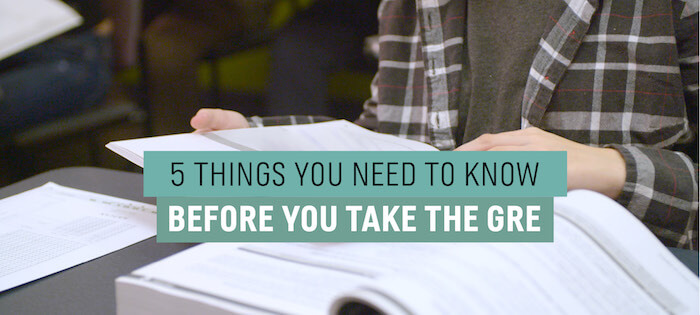Maybe you've just registered for the GRE and are already thinking ahead to test day—or maybe your test is in a few hours (or days, or minutes) and you're starting to feel a little wobbly about taking it. In either case, you're in the right place!
Whether you're a novice or an expert test-taker, here are the five most important things you need to know before you take the GRE.
1. You can't wing it. The GRE is a difficult exam, yes. On the other hand, it's also a standardized exam, meaning that it tests you according to specific patterns that you can learn ahead of time. So be assured that there are a limited number of concepts and question types that you'll see on test day.
With that said…the GRE test is difficult. To give yourself the best chance at getting the score you need for your dream programs, you need to learn those concepts and master those question types well in advance. How far in advance will depend on your current skill set. The best thing to do? Take a GRE diagnostic to see where you currently stand in terms of your test-specific knowledge, then create a study schedule around your strengths and weaknesses.
2. You need very specific tools. When you're prepping for the GRE, just rifling through your high school math notes isn't going to cut it. True, the math that the GRE tests is not high-level calculus—but it's difficult in its own way, testing a variety of concepts in each problem and using tricky formats to evaluate your reasoning. What this means is that you need test-specific resources. The materials you use should provide realistic questions, good explanations, and a variety of practice tests so that you can master exactly how to work out each type of problem you'll see on the GRE test.
3. Only perfect practice makes perfect. You can work on GRE practice problems while standing in line for brunch all you want (if, you know, you can tolerate it!), but unless you're working some of the time under test-like conditions, you won't have the opportunity to polish the skills you need before test day. Try to take at least one practice test a week in test-like conditions: a quiet area, timed precisely, with no going back to other sections as you work through the test in order. Then, analyze your test the next day: did you run out of time? What types of problems did you miss? Keeping a log of these can help you get a handle on exactly where you might slip up on test day.
4. The right test date can make all the difference. First of all, GRE seats fill up quickly, because the test centers offering the GRE also offer a variety of other tests—so register as soon as you know when you want to take the exam! Don't leave it too long, or you might not be able to get your preferred timeslot or test center. By choosing between your preferred GRE dates, you'll be able to find your Goldilocks test slot: not too far away (to allow for a retake if necessary), not too soon.
5. Perfectionism has its time and place…and that time and place is during your GRE practice, not on test day! Don't be too hard on yourself in practice—you're learning, after all—but when it comes to the official exam, know when to let a problem go. In both the Verbal and Quant sections, you'll have just over a minute per question. If two minutes have passed and you haven't solved the problem (even if you feel like you're just about to), eliminate the answer choices you can, make your best guess, and then move on.
At the end of the day, your experience on GRE test day will have a lot to do with your experiences before the official exam. By preparing thoroughly, constantly analyzing your work, and knowing what's in store, you'll give yourself your best chance at getting the score—and into the program—of your dreams.
![]() Rachel Kapelke-Dale blogs about graduate school admissions for Magoosh. She has a BA from Brown University, and did her own graduate work at the Université de Paris VII (Master Recherche) and University College London (PhD). She has taught and written about test preparation and admissions practices for eight years.
Rachel Kapelke-Dale blogs about graduate school admissions for Magoosh. She has a BA from Brown University, and did her own graduate work at the Université de Paris VII (Master Recherche) and University College London (PhD). She has taught and written about test preparation and admissions practices for eight years.
Related Resources:
• Get Your Game On: Prepping For Your Grad School Application
• Making Friends With the GRE: How To Overcome Test Anxiety and Perform at Your Best
• Affordable Online Test Prep, a podcast episode
This article originally appeared on blog.accepted.com.
Applying to a top b-school? The talented folks at Accepted have helped hundreds of applicants get accepted to their dream programs. Whether you are figuring out where to apply, writing your application essays, or prepping for your interviews, we are just a call (or click) away.
Contact us, and get matched up with the consultant who will help you get accepted!


